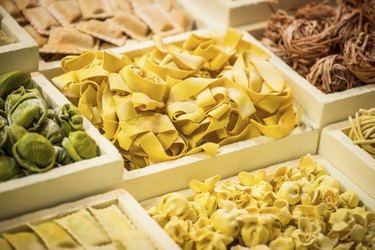
Every home cook has had this experience: The handful of dry spaghetti you pulled from the box ballooned into a full pot of pasta when cooked. Store those extra noodles to make future meal prep easy by freezing either fresh or cooked pasta. Reheating frozen pasta is as easy as submerging it in boiling water for a few minutes. You may need to boil fresh pasta for an extra minute or two.
Fresh Pasta
Video of the Day
Work quickly to freeze fresh pasta as soon as possible after making it, and don't cook it before freezing. Rather, toss the cut pasta with flour to keep the pieces from sticking together and transfer it to baking sheets covered with parchment paper. Arrange shaped pasta in a single layer so that the pieces don't touch. Stretch out long noodles or arrange them in small nests. Freeze the sheets until the pasta feels hard -- 30 minutes or so -- then move the pasta into airtight freezer bags or boxes and into the freezer.
Video of the Day
Cooked Pasta
You can prepare cooked, al dente pasta as you would fresh pasta by quickly freezing it on baking sheets covered with parchment paper and transferring it to freezer bags or airtight storage boxes. Alternately, toss plain pasta with olive oil and scoop it directly into storage containers; the pieces should separate when reheated. If you've made a pasta dish with sauce, such as macaroni and cheese, wrap the uncooked casserole with several layers of foil and freeze it.